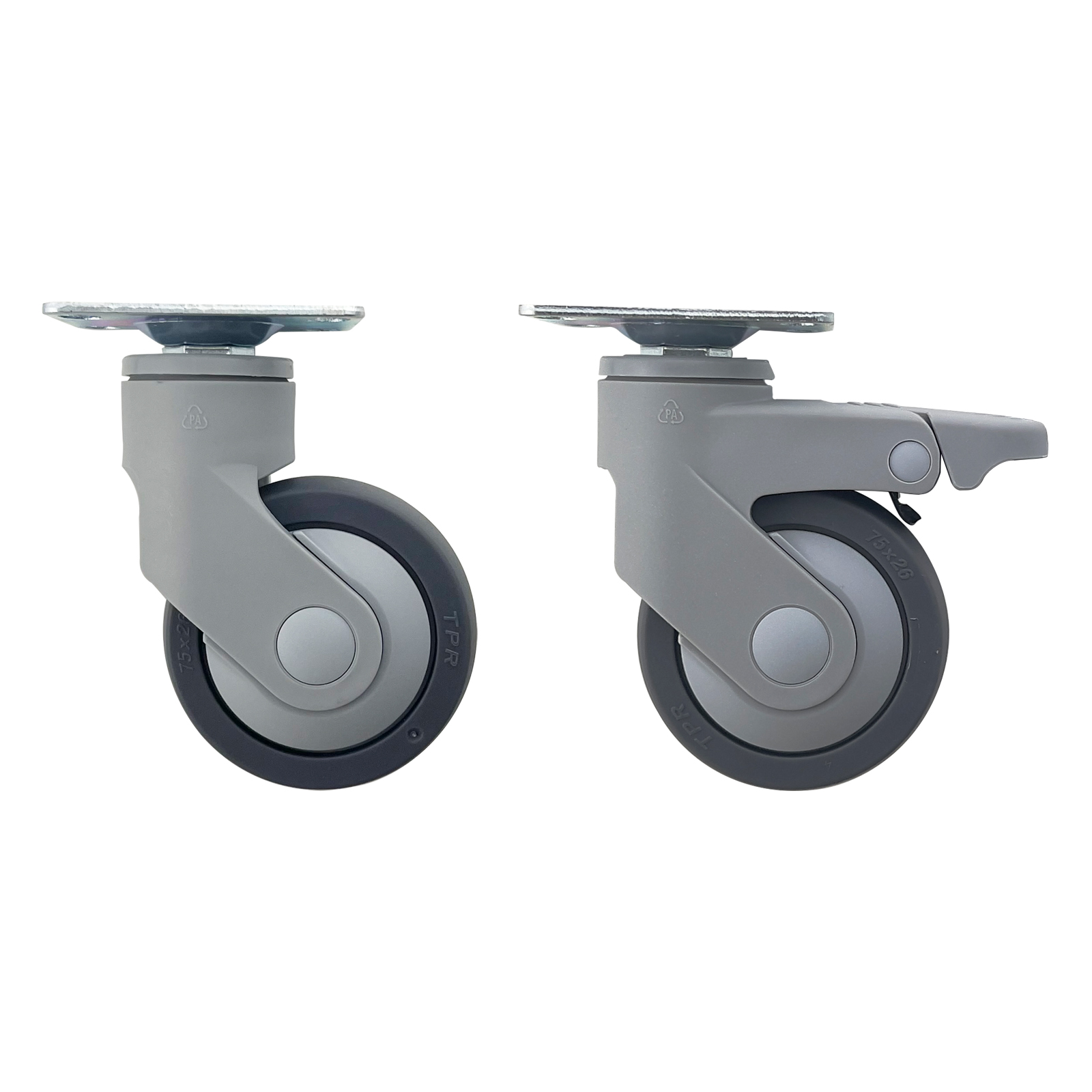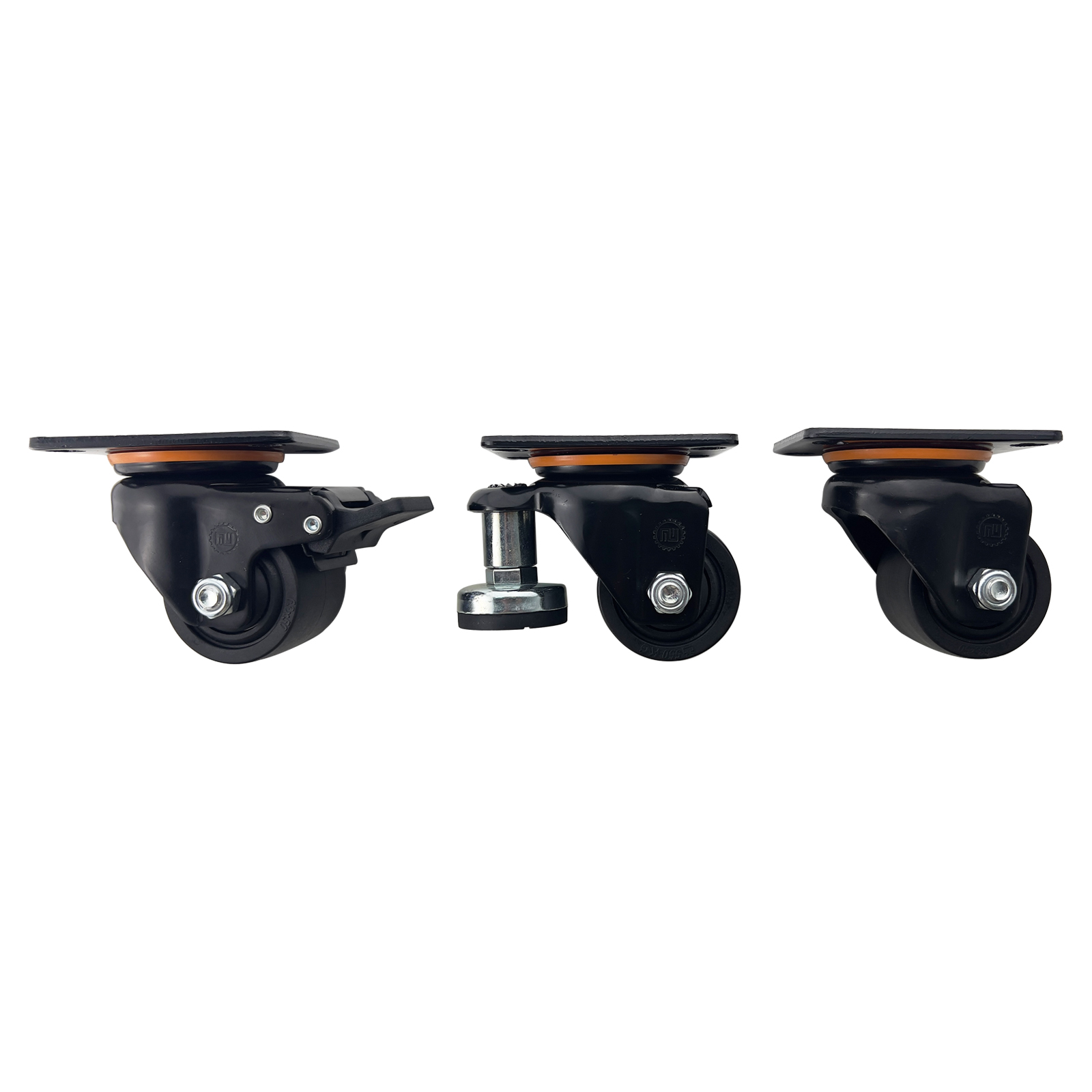When selecting casters for light industrial use, material choice is one of the most important decisions that impact performance, durability, and cost-efficiency. Two popular caster wheel materials—PU (polyurethane) casters and polyolefin casters—offer unique advantages and limitations, making them suitable for different applications. Understanding these differences is critical for industries looking to optimize workflow, reduce maintenance costs, and improve safety. Here we will provide a comparison of PU and polyolefin casters in the context of light industrial environments. Whether you're sourcing caster wheels for warehouse carts, factory trolleys, or material handling equipment, this guide will help you make an informed decision.
What are PU Casters?
PU (polyurethane) casters are made from a synthetic resin known for its elasticity, durability, and resistance to wear. These casters often consist of a metal or plastic core wrapped in a layer of polyurethane tread.
What are Polyolefin Casters?
Polyolefin casters are made from a thermoplastic polymer known as polyolefin, often molded into a solid, hard wheel. These wheels are lightweight, non-marking, and resist water and most chemicals.
Performance Comparison
1. Load Capacity
For light industrial tasks, such as moving utility carts, equipment racks, or assembly line bins, load capacity is essential.
● Polyolefin casters typically support moderate loads efficiently, often up to 500 lbs per caster.
● PU casters, though more expensive, can carry similar or even higher loads while maintaining better shock absorption.
Key takeaway: If you’re handling sensitive materials or require a smoother ride for heavier loads, PU wheels offer an advantage.
2. Floor Protection
One of the key considerations for light industrial settings—especially on epoxy-coated concrete, vinyl, or tile floors—is minimizing damage and preserving surface integrity.
● Polyurethane caster wheels are non-marking and gentler on floors, reducing scratches and wear.
● Polyolefin wheels, while non-marking, are harder and may scuff softer flooring materials.
Ideal use: Choose PU for environments where aesthetics or floor maintenance is a priority, such as production labs or cleanrooms.
3. Noise Level
Casters operating in environments like medical manufacturing, food processing plants, or office-adjacent storage need to limit operational noise.
● PU casters absorb vibrations and produce significantly less noise.
● Polyolefin casters are harder and create more audible rolling sounds, especially over uneven surfaces.
For quieter performance, PU casters are the superior choice.
4. Chemical Resistance
Polyolefin shines in chemical-heavy environments due to its excellent resistance:
● It resists water, solvents, acids, and most cleaning agents, making it a common choice in janitorial carts, lab trolleys, and chemical transport carts.
● PU wheels have good chemical resistance but can degrade under prolonged exposure to oils and certain solvents.
Summary: For light industrial carts exposed to cleaning agents or chemicals, polyolefin offers better long-term resistance.
5. Temperature Tolerance
Casters used in freezers, high-temperature drying rooms, or autoclave areas need to perform reliably under extreme temperatures.
● Polyolefin caster wheels can generally operate from -40°F to 180°F.
● PU casters typically function within -20°F to 160°F, depending on the formulation.
Choose polyolefin for broader temperature extremes.
Cost and Lifespan Considerations
Initial Investment
● Polyolefin casters are generally more affordable, making them a cost-effective choice for businesses needing to equip a large fleet of carts.
● PU caster wheels cost more initially but offer a longer lifespan and smoother rolling.
Lifespan and Maintenance
PU casters offer better resistance to abrasion and deformation under load (known as “flat-spotting”), particularly useful for stationary carts that bear weight for long periods. Polyolefin may crack over time under repeated stress or impact.
If downtime is costly, PU casters may save more in the long run despite higher upfront costs.
Application-Based Recommendations
PU Casters – Best for:
● Warehouse picking carts
● Electronic assembly stations
● Medical equipment
● Light-duty dollies in offices or schools
● Furniture and display stands in retail stores
Polyolefin Casters – Best for:
● Chemical transport carts
● Food processing bins
● Storage carts in moist environments
● Utility carts in janitorial or sanitation settings
● Freezer-safe racks or cold storage bins
Sourcing Considerations: Where to Buy PU and Polyolefin Casters?
When selecting casters for light industrial use, it’s essential to source from a reliable caster manufacturer. Some reputable caster wheel suppliers offer both PU and polyolefin options in various sizes, load ratings, and mounting styles. Look for features such as:
● Double ball bearings for smooth swivel action
● Thread guards to prevent debris build-up
● Zinc-plated or stainless steel yokes for corrosion resistance
Many industrial caster manufacturers also offer custom caster solutions, allowing you to tailor wheel materials, diameter, and mounting options to your specific equipment.
Recommendation: Choose Manywell for High-Quality Industrial Caster Solutions
If you are looking for reliable and well-performing caster solutions for light industrial applications, Manywell is a trusted industrial caster manufacturer. We offer a wide range of standard caster wheels, including PU casters and polyolefin casters, and also provide custom caster solutions tailored to your specific needs.
Whether your application involves warehouse picking carts, medical trolleys, food processing equipment, or chemical transport carts, Manywell delivers high-performance, durable caster wheels designed to meet industry standards. Our products are widely used across factories, logistics operations, cold storage, and laboratories, among many other light industrial environments.
Partner with Manywell to get expert selection advice, responsive customer service, and caster solutions that make your operations safer and more efficient.
Industrial Caster Manufacturer
Conclusion: Which Should You Choose?
The decision between PU casters and polyolefin casters ultimately depends on your specific light industrial application. Here’s a quick breakdown:
| Feature | PU Casters | Polyolefin Casters |
| Floor Protection | Excellent | Moderate |
| Noise Level | Low | High |
| Load Capacity | High (with shock absorption) | Moderate |
| Chemical Resistance | Good | Excellent |
| Cost | Higher | Lower |
| Temperature Range | Moderate | Wider range |
| Rolling Smoothness | Very Smooth | Fair |
If you prioritize floor protection, quiet operation, and shock absorption, PU casters are an excellent choice. For chemical exposure, lower cost, and extreme temperatures, polyolefin may serve better.
To ensure you’re getting the most appropriate solution, consider working with an experienced caster supplier. Manywell provides not only high-quality standard caster wheels but also flexible caster customization options tailored to your application.

